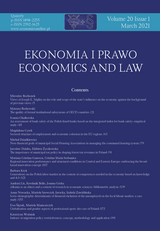WPROWADZENIE DO PROBLEMATYKI OPODATKOWANIA „KONTROLOWANYCH SPÓŁEK ZAGRANICZNYCH”
INTRODUCTION TO THE PROBLEMS OF TAXATION OF "CONTROLLED FOREIGN COMPANIES"
Author(s): Błażej KuźniackiSubject(s): International Law, Economic policy, Law on Economics, Fiscal Politics / Budgeting, EU-Legislation
Published by: Wydawnictwo Naukowe Uniwersytetu Mikołaja Kopernika
Keywords: taxation of controlled foreign companies; CFC; economic integration; International tax law; EU Law;
Summary/Abstract: This article deals with the problems of taxation of controlled foreign companies (hereinafter: CFC) in the light of the contemporary process of economic integration, international tax law and the European Union law. In general, the Controlled Foreign Companies rules (hereinafter: CFC rules) can be defined as specific anti-tax avoidance measures that grant the right of the shareholders’ country to attribute certain income generated by CFC to its shareholders and subsequently levy tax on it. The CFC rules may be applied either by regarding the company as a transparent entity (disregarded legal entity/piercing the veil approach), or deeming a distribution of the undistributed profits generated by the foreign company to the shareholder (deemed dividend approach). It should be noted that without the CFC rules, taxation – in the shareholders’ country – of income generated or received by a CFC is deferred until the distribution of profits by the CFC to its shareholders. Furthermore, if the CFC is established in a jurisdiction that does not impose taxes or imposes taxes at the very low rates, for instance a tax haven, or in a state or territory with a lenient tax regime, and the dividends are never distributed to the shareholders, the income is not subject to tax eventually. Thus, in nutshell, a common feature of the CFC rules is not to lose tax revenue in high tax countries by curbing the abuse of companies established on an international level for the sole purpose of avoiding taxation.
Journal: Ekonomia i Prawo. Economics and Law
- Issue Year: 8/2012
- Issue No: 1
- Page Range: 171-188
- Page Count: 18
- Language: Polish

